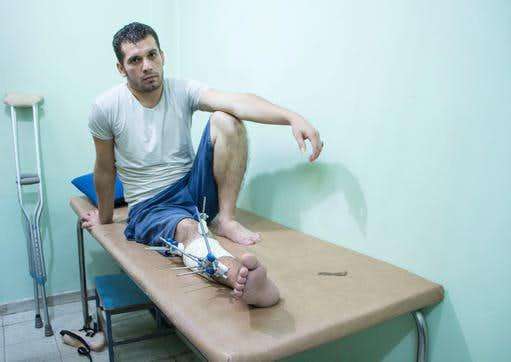PARIS/NEW YORK, NOVEMBER 29, 2018—Thousands of people shot by the Israeli army during protests in Gaza this year are overwhelming the Gazan medical system with complex wounds, infections, and disabilities, the international medical humanitarian organization Doctors Without Borders/Médecins Sans Frontières (MSF) said today.
MSF personnel work in four hospitals and five postoperative clinics in the Gaza Strip, providing dressing changes, physiotherapy, and plastic and orthopedic surgery. The cumulative needs of wounded patients are creating a medical emergency, as the lack of appropriate treatment in Gaza's crippled health system leads to a high risk of infection, especially for patients with open fractures.
"Osteomyelitis is a deep infection of the bone," Dr. Mohammed Abu Mughaiseeb, MSF medical referent in Gaza, wrote recently. "If it goes untreated, it can lead to non-healing wounds and increase the risk of amputation. And as time goes on, it gets worse. These infections need to be treated as soon as possible. It's terrifying to think they could lead to amputation for these young men. But the infection is not easy to diagnose and there is currently no structure in Gaza for analyzing bone samples to identify it."
Of the 3,117 patients treated by MSF from March 30 to October 31, the vast majority were shot in the legs; about half suffered open fractures, and many suffered severe soft tissue damage. (The total number of people hospitalized with gunshot wounds in this period is 5,866, according to Gaza's Ministry of Health.)
It is not yet possible to properly diagnose many bone infections in Gaza due to the lack of laboratory facilities. However, from MSF's experience with war trauma in the region, MSF expects that at least 25 percent of Gazan patients with open fractures have bone infections, and about 60 percent of all those injured by gunshots will need further surgery, physiotherapy, and rehabilitation.
In addition, a significant proportion of those patients will require some form of reconstructive surgery to properly heal, but untreated infections will prevent that from happening. This burden is too much to bear for the health system in Gaza in its current form, weakened as it is by more than a decade of blockade.
Such a large number of injuries affects not just those injured, but also strains the provision of regular health care in Gaza. The consequences of these wounds—especially if untreated—will be lifelong disability for many, and, if infections are not properly treated, amputation or even death.
Although MSF and other organizations are working to provide treatment for these patients, the scale of the needs is quickly becoming overwhelming, challenging MSF's continued ability to respond. The situation is also worsening as more people are shot, wounded flesh and bone dies, and the risk of infection increases. An adequate response will require major funding, which is urgently needed.
"MSF has already tripled its capacity in Gaza but the volume required of surgery, carefully managed antibiotics, intensive nursing care, and long-term physiotherapy and rehabilitation is staggering," said Marie-Elisabeth Ingres, MSF's head of mission in the Palestinian Territories. "This many patients would overstretch the best health care systems in the world. In Gaza, it is a crushing blow."
MSF currently has 260 personnel working in Gaza, but much more support is needed to equip hospitals, provide drugs and equipment, send specialized surgeons, and open paths to treatment for all patients, whether within Gaza or outside it.
"What is required now is for the Israeli and Palestinian authorities to do all they can to facilitate the free access and work of all health care providers in Gaza that are trying to build the advanced capacity to care for these people; for other countries in the region and around the globe to step forward and offer funding and space in their hospitals where advanced surgical capacity exists; and for authorities in Palestine and Israel to facilitate the transfer of these patients abroad," Ingres said. "The alternative—that thousands of patients will be left to deal with terrible injuries, with many permanently disabled and dependent on their families—is unconscionable when adequate treatment is within the world's grasp."





